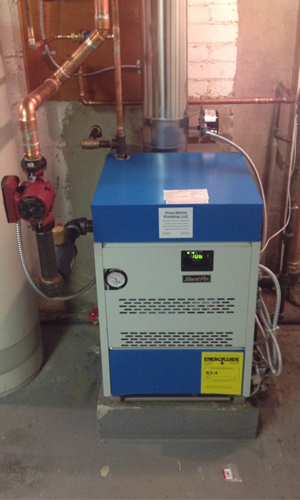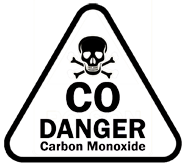A fall boiler inspection prevents possible breakdowns and the inconvenience of having no heat on bitterly cold nights. It will help you to avoid having those costly after hour service calls to fix your boiler. Here are some boiler inspection tips that you can follow yourself before you turn on the heat.
Boiler Inspection pt1 (upstairs)
Battery operated thermostats
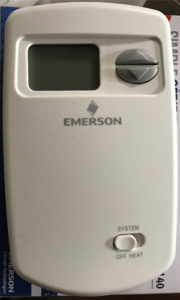
The first part of the boiler inspection actually starts upstairs with the thermostat. If you have a thermostat, that uses batteries, make sure to remind yourself every spring to change them. By doing this maintenance you eliminate several serious problems from possibly occurring, and they are:
- no heat
- frozen pipes
- water damage
If you have a thermostat that uses batteries, it probably was installed for one reason, the heating equipment low voltage circuitry doesn’t put out exactly twenty-four volts. A low voltage thermostat requires exactly twenty-four volts to function. Some modern boilers use up most of the twenty-four-volt circuit through their controls, by the time the electric current gets to the thermostat wiring it’s not enough for it to work.
Mercury thermostats
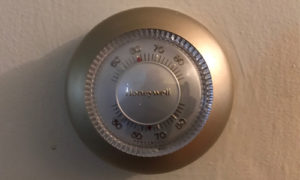
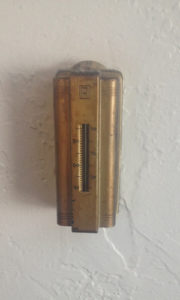
Remove the outer cover and blow away any dust accumulation on the mercury glass bulb. Dust build up can make the thermostat function inaccurately. An inaccurate temperature reading could cause the boiler to stay on longer than it should. Longer than necessary heating cycles are inefficient and could create a detrimental situation if the boiler safety controls stop working.
Existing mercury thermostats are allowed for use, but technically should be removed and replaced with a modern thermostat that is mercury free.
Why replace a mercury thermostat?
Here is why you should update to a modern thermostat:
- control safety
- efficiency
- mercury is banned
Mercury operated thermostats are not manufactured anymore read the mercury-free thermostat act. If you have one controlling your boiler, it would be very beneficial for you to have it replaced.
Boiler Inspection pt2 (downstairs)
Look around the boiler
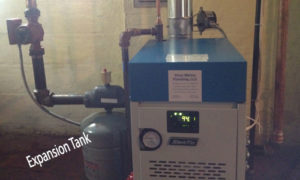
The second part of the boiler inspection is a visual inspection around the boiler to see if you find any of the following problems:
- The use of dissimilar metals on boiler installations like copper pipe joined to steel pipe will cause electrolysis (or corrosion) to take place. Shortly afterwards deterioration of the piping connections and the boiler will occur. If you see this, you want to get it fixed quickly. The longer you let it go, the worse it will get.
- Water leaks come from a few things such as loose pipe connections, cracked boiler sections, high water pressure, and having no expansion cushion which will cause the relief valve to drip. If you find leaks, close off the water supply to the boiler until repairs can be done by a qualified repairman or (preferably) licensed plumber.
- If you see black soot around the boiler or its vent pipe, this means either you have poor combustible air or a clogged chimney which is causing a back draft in the boilers flue pipe. You want to make sure there is plenty of fresh air entering your basement so the boiler can fire appropriately and not suffocate.
- This is a problem that can cause a build up of carbon monoxide in your home and should be fixed correctly. If you see black soot, Schedule a call with Vince Immediately!
- The smell of gas – If you happen to smell gas, this means there is a leak somewhere. Typically any of the pipe and fittings supplying natural gas to the boiler could be loose. Also, pilot tubing and the gas controller (or gas valve which turns the burners on and off) could be worn out and need to be replaced. If you smell gas, you want to close the shut-off valve located on the gas pipe nearby the boiler. Also, shut the electric off to the boiler as well. And to be safe, you should shut off your water heater as well.
- This is a problem that can cause suffocation and/or an explosion in your home and should be fixed correctly. If you smell gas in your home, Schedule a call with Vince Immediately!
What do you do if you find problems?
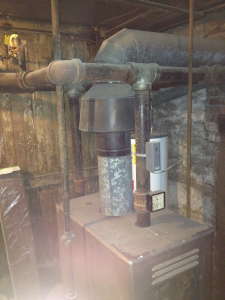
If you find any problems or think there is something wrong with your boiler don’t wait. Depending on what the circumstances are you may create significant problems for yourself. A simple check every year around the end of August (or at least by the end of September) will save you lots of money and keep you warm.
Schedule now!
Click right here and schedule a boiler inspection with Vince Marino, an experienced plumber in Pittsburgh who has many years of experience with hot water and steam heating systems.

